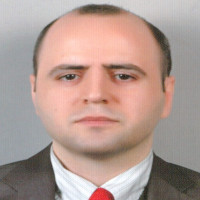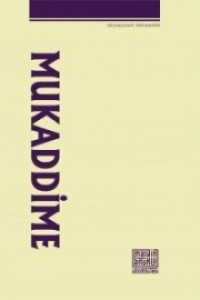Research Article
Book Review
Aim & Scope
Mukaddime Journal is a peer-reviewed journal published twice a year (May and November) by Mardin Artuklu University Institute of Graduate Studies (formerly Institute of Social Sciences) in May 2010. The journal is published electronically. In one issue of Mukaddime, there are 10-12 research articles and 3 book reviews/evaluations.
In Mukaddime, original studies that deal with the socio-cultural developments in the Middle East geography in the historical process from an analytical perspective are included. The journal aims to be one of the leading publications in the evaluation of regional developments with the qualified academic content it publishes. APA (6th Edition) bibliography and citation system is used in the journal. The publication language of the journal is Turkish. Manuscripts submitted in other languages are evaluated by the Editorial Board. Mukaddime Journal is open access and does not charge any fee from authors and readers. The journal follows the Open Access Policy of the Budapest Open Access Initiative, for details see https://www.budapestopenaccessinitiative.org/translations/turkish-translation.
Mukaddime follows a publication policy that prioritizes the highest level of contribution to science with original studies focusing on the philosophical, historical and socio-cultural context. It prioritizes the publication of studies in the relevant fields that are handled from an analytical perspective and present original ideas. However, the journal is also open to new interpretations, approaches and analyses developed in all other fields of social sciences in relation to history, philosophy and sociology. In addition to theoretical and analytical studies, the journal includes book introductions/criticism, research notes and reviews of scientific meetings. Thus, it is aimed to lead the way in generating new ideas as a reflection of the effects of these views and approaches.
Manuscripts submitted to the journal should not have been published before or be under evaluation in another scientific publication. Articles directly derived from completed graduate studies (master's and doctoral theses) that are available online are not accepted. The race, gender, religious affiliation, ethnicity, ethnic origin, political orientation of the author(s) are not considered. All incoming articles are pre-evaluated by the Editorial Board according to scientific criteria before being sent to referees. Manuscripts that do not pass the pre-evaluation stage are returned to their authors. The manuscripts that pass the preliminary evaluation stage are sent to two referees who are experts in the subject with the "blind referee" method to be evaluated. Each referee is asked to fill in the evaluation form related to the study or to prepare a separate report if deemed necessary. In case the two referees disagree, a third referee is consulted. The referees' reports are notified to the author(s), provided that the names of the referees are kept confidential. If one or both of the referees state that the manuscript "can be published after corrections", the manuscript is sent to the author for the necessary corrections. The article is published if at least two referees give a positive report. After the corrections are made, the referees and the Editorial Board evaluate whether the warnings of the referees have been taken into consideration. All legal and legal responsibility for the language, style, content, etc. of the published articles belongs to the author.
Author Guidelines
Please write your articles on the template word document provided below. Files uploaded using a different template will not be considered:
1. Articles should consist of 6,000-10,000 words; book reviews should consist of 1,500-2,500 words. Articles with word counts outside these limits are evaluated by the Editorial Board.
2. Articles should have three separate abstracts (abstract-summary) of at least 600 words in English and 200 words in Turkish and English, in addition to the title and keywords. The title, institution and address information of the author(s) should be given on the first page of the article. A bibliography should be added at the end of the text.
3. Manuscripts should be written in PC Microsoft Office Word (Word 97 or a more advanced version) or adapted to this program and sent in Word and PDF format.
4. The page layout should be A4 size, with margins of 2.0 cm on the left, 2.0 cm on the right, 3.0 cm on the top and 2.0 cm on the bottom.
5. The text should be written in Candara font and 10 pt. font; headings should be in bold; the entire text should be single-spaced, footnotes should be single-spaced and 8 pt. font, narrowing from the margins. Footnote writing rules apply to quotations given in the text, and the quotations should be given separately from the original text by narrowing the margins.
6. Drawings, graphics, pictures and similar materials used in the articles should be in JPEG or GIF format. Visual materials and attachments should be sent separately via e-mail when necessary.
7. Authors are required to use APA 6 citation system in their articles. References should be given in alphabetical order at the end of the text.
8. The article file uploaded to the site must be sent with the author name deleted. Files uploaded without deleting the author name will not be taken into consideration.
Ethical Principles and Publication Policy
Ethical Principles
The publication process in the Mukaddime was created to develop and present information objectively. For this reason, the processes applied to reflect the quality of the authors and the quality of the institutional work that supports the authors. The articles reviewed embody and encourage the scientific method. In this respect, it is important that all stakeholders of the process (authors, readers and researchers, publishers, referees and editors) comply with the standards regarding ethical principles.
Mukaddime expects all stakeholders to bear the ethical responsibilities described below within the scope of publication ethics.
The ethical duties and responsibilities adopted by the Mukaddime have been prepared by taking into account the Committee on Publication Ethics (COPE) guidelines and policies.
Actions contrary to scientific research and publication ethics:
Plagiarism: Presenting others’ ideas, methods, data, practices, writing, forms or studies partly or wholly without referencing to the owners according to scientific rules,
Forgery: Producing data that is not based on research, editing or changing the presented or published study by basing it on fictitious data, reporting or publishing these, claiming research has been done while actually it has not,
Distortion: Falsifying the obtained data and the research records, showing the methods, devices and materials that were not used in the study as if they had been used, not taking the data that is not suitable to the research hypothesis into consideration, changing the data and/or results to make them be appropriate to the related theory and presuppositions, falsifying or manipulating the research results in accordance with the advantages of the people and the institutions that support the researcher,
Re-publishing: To present more than one work containing the same results of a research separately in evaluations for associate professorship exams and academic promotions,
Dissection: Dissecting the results of a study in a way that would destroy the integrity of the study and inappropriately, publishing them separately without referencing each study, thus increasing the number of publications to present them in associate professorship exam evaluations and academic promotions,
Undeserved Authorship: Including those who don’t have an active contribution among authors, not including those who have an active contribution among authors, changing the ranking of authors without a reason and inappropriately, excluding the names of those with active contribution from the study during publication or in next publications, making one’s name included – by exerting influence – in authors despite having no active contribution,
Other Types of Violation of Ethics: Not naming the people, institutions and organizations and their contributions to the study openly in the publication of the research made by the support of those, not following the ethical rules in studies done on humans or animals, not respecting the rights of patients in the publications, sharing the contents of a study appointed as referee before its publication, using the sources, places, opportunities and devices provided for scientific researches out of their purposes, accusing someone of violation of ethics in a baseless, injudicious and malicious way.
Ethical Statement
• Ethical rules must be complied with in the studies conducted on humans and animals.
• It should be stated that the copyright regulations are complied with for the intellectual and artistic works used.
• Necessary permissions must be obtained to use others' scale, questionnaires, photographs, etc. and stated.
• In the case of studies, an "informed consent form" should be obtained and stated.
• If the research has been conducted in the fields listed below, it is mandatory to upload an “Ethics Committee Approval” in the annex of the study.
Studies Requiring Ethics Committee Approval
• All kinds of research conducted with qualitative or quantitative approaches that require data collection from participants using questionnaires, interviews, focus group work, observation, experimentation,
• Use of humans and animals (including material/data) for experimental or other scientific purposes,
• Clinical studies on humans
• Clinical studies on animals,
• Retrospective studies in accordance with the law on the protection of personal data.
Publication of research that involve human subjects (i.e., surveys and interviews)
Mukaddime adopts the "Code of Conduct and Best Practice Guidelines for Journal Editors" and "Code of Conduct for Journal Publishers" of the Publication Ethics Committee (COPE) in order to create ethical assurance in scientific periodicals. In this context, the following points should be followed in the manuscripts submitted to the journal:
1) For research conducted in all branches of science that requires ethics committee approval (ethics committee approval should be obtained, this approval should be stated and documented in the article.
2) In research that requires ethics committee permission, information about the permission (name of the committee, date, and number) is in the method section, and also on one of the first/last pages of the article; In case of reports, information about signing the informed consent/consent form should be included in the article.
Responsibilities of Writers
• Article Writing
All authors cited as research writers must contribute to the research substantially. Other contributors should be listed as co-authors. Contributors to the research should be mentioned as 'contributors'. The corresponding author should take the consent of other authors before sending the study to the journal. Those who do not have a direct contribution to the research should not be listed as authors.
• Originality and Authenticity
All data in the study must be true and original. The author should present an objective discussion of the importance of his work based on accurate data. Intentionally presenting false information is unacceptable and unethical behavior.
• Multiple, Unnecessary and Simultaneous Publishing
The author should not attempt to publish the same research in more than one journal, or attempt to republish a previously published article, and should comply with scientific research and publication ethics. Such attempts are unacceptable unethical behaviors.
• Resources
It is mandatory to show / cite all sources used in the study.
• Disclosure and Conflict of Interest
All authors must clearly state any potential financial and interest conflicts that may affect the results of the study. If financial support has been received for the study, its sources should be indicated.
• Publishing Fee
No fee is charged from the authors for any research published in our journal.
• Correction of Published Studies
It is the author's responsibility to inform the editor if any significant deficit or mistake is detected in the published work. The author should cooperate with the editorial team of our journal in order to take the necessary actions to correct the situation.
• Withdrawal of the Article
The author can only withdraw the work evaluated in the publishing processes at the pre-check stage. Works cannot be withdrawn at other stages of the publishing process.
• Originality and Plagiarism
Authors should aim to make original research and report. The mentioned literature should be appropriately cited. Uncited mentions from other publications, including the author's own work, are an important moral issue and a crime. If plagiarism is detected in the articles submitted to our journal, they are removed from the publication processes immediately. If it detected after publication, immediate action is going to be taken about the author and the article.
• Double-Blind Refereeing
As double-blind refereeing is applied in our journal, author information should not be written in the article file.
Responsibilities of Referees
• Contribution to the Editorial Decision
The referee is obliged to consult the "Referee Evaluation Criteria" in the evaluation process from the moment they are appointed and accepted the task through the system. The referee assists editors with their editorial decisions and assists authors in improving their articles through editorial communication. The referee should point out the completion of other articles, works, references, citations, rules and similar shortcomings related to the article.
• Abiding by the Schedule
Any referee who does not feel qualified to review the article proposal or knows that the article review cannot take place on time should immediately notify the editors and decline the invitation to review, thereby ensuring that the new referee assignment is made.
• Confidentiality
Articles reviewed should be kept confidential before publication.
Referees acknowledge that the work submitted for their review is the private property of the authors. This also applies to referees who decline their invitation to review.
The names of the referees are not disclosed / published.
• Objectivity
Referees should be objective in the decision to publish the text they examine.
Comments on the text should be made impartially and recommendations should be made in a way that the authors can use to improve the text.
Personal criticism of the authors is not appropriate.
• Resources
The referee should identify relevant published work that is not cited by the authors. The referee should also inform the editor of any significant similarities between the article reviewed and any other article(published or unpublished).
• Conflict of Interest
Conflicts of interest should be reported to the editor. There should be no conflict of interest between the referees and the stakeholders of the article under review. In case of any conflict of interest and an appointment outside of the field of expertise, it is recommended to present the situation to the editor and withdraw from the referee process if necessary.
• Ethics
Should the referees notice any ethical violation, plagiarism, etc. they should inform the editor. Referees acknowledge that the work submitted for review is the private property of the authors.
Editorial Responsibilities
• The Editorial Board have all the responsibility and authority to accept or decline an article.
• The Editorial Board should not be in a conflict of interest about the articles they accepted or declined.
• In the publication process, studies are selected and evaluated according to scientific and academic criteria such as contribution to the field and originality.
• The Editorial Board ensures publication of a correction or withdrawal in case of a mistake or an incompleteness detected in a published article.
• Since double-blind refereeing is adopted in the journal, the names of the referees are kept confidential and not published.
• The refereeing process is at the center of the success of scientific publishing. It is part of our commitment to maintain and improve the referee process.
• Mukaddime takes the necessary precautions carefully in cases of violation of publishing ethics.
• All kinds of complaints and suggestions regarding the studies published in Mukaddime, publication processes and editorial team can be sent to the address mukaddime@artuklu.edu.tr
• Any feedback from stakeholders is considered an important contribution to R&D studies.
Publication Language
• The publication language of the Mukaddime is Turkish. In addition, scientific studies in English, Arabic and Kurdish are also published.
Publication Principles
• All control and evaluation processes of the texts are reported and archived in Dergipark.
• The texts that are not adjusted according to the Writing Rules are returned to the author without being taken into the evaluation process.
• Mukaddime publishes texts that was not previously published elsewhere.
• Texts that are in the evaluation process for another journal are returned to the author.
• No more than one (1) study of an author can be published in the same issue regardless of the text type.
Publication Policies
• Mukaddime, besides publishing qualified scientific research, has made it a mission to contribute to the author and academic journalism besides publishing qualified scientific research.
• The Publishing Processes carried out by the Editorial team, experts in their fields, have been determined in line with this mission.
• Mukaddime is a publication of Mardin Artuklu University.
• Mukaddime is an international peer-reviewed journal.
• Mukaddime is published in electronic media.
• Mukaddime is published twice a year, as one volume two issues, May and November.
• In Mukaddime, all policies and processes are decided by the editorial board.
• Special issues can be published with the decision of the editorial board.
• Changes to journal publishing policies and processes are announced on the journal's official website.
• Mukaddime has an original 6-step Publishing Process. Each stage in the publishing process is carried out according to specific evaluation criteria within the framework of defined job descriptions and workflows.
Evaluation Policies
Articles and translations are subjected to two types of evaluation:
Structural Evaluation
• Writing Control: The texts are examined in terms of shape, writing rules and compliance with the ISNAD-2 Citation System. Authors should make the corrections within 11 days.
• Plagiarism/Similarity Control: Texts are examined in terms of plagiarism/similarity rate. The plagiarism/similarity rate determined by the Editorial Board is 20%. Articles exceeding this rate are rejected without being included in the referee process.
• Language Control: For Turkish texts, the Abstract section, and for texts written in other languages, the Abstract, and Öz sections are grammatically checked.
• Revision and Proofreading: In order to ensure the unity in linguistic expression and writing style, necessary corrections are made to the language and style of the text without interfering with the content and within the knowledge of the author. After this stage, no correction is requested from the author, but the text is sent to the author for the final reading.
Academic Evaluation
Editorial Board Evaluation
• Taking the field of the text into account, each article is sent to two editorial board members by the editor.
• Editorial Board members examine and evaluate the studies according to the Editorial Board Evaluation Criteria within the framework of a double-blind evaluation system and make referee recommendations.
• Referee Evaluation:
• The texts are subjected to academic evaluation by the referees determined by the editorial board. In the referee evaluation process, the text is sent to the author for corrections if the referee requests it. The author must fill in the Author Correction Form along with the corrected text.
• If the texts receive positive reports from both referees, they are submitted to the Editorial Board is submitted to its final decision.
Texts with a negative report by one referee are returned to the author, even if the other is positive.
• It is important that the authors do not exceed the dates given for corrections in order for the journal publishing process to function properly. The texts of the authors who do not make corrections within the specified dates are removed from the evaluation process.
Referee Policy
• In Mukaddime double-sided blind refereeing system is applied.
• Confidentiality is essential in the referee reports; therefore, referee names are not mentioned in the journal.
• Multiple articles can be sent to a referee.
Special Issue Publication Policy
A special issue can be published once a year upon the decision of the Editorial Board. Articles submitted for publication in the special issue are subject to the publication processes of the journal.
As in the regular issue, the journal's publication processes (Editorial Board Evaluation (double-blind), Spelling and Plagiarism Control, Referee Evaluation (double-blind), Language Control, and Proofreading) are applied in the special issue.
Archive Policy
• The journal is sent to the domestic and foreign libraries determined by the Editorial Board and to international index institutions within one month from the date of publication.
Copyright Policy
• From the date of its submission to the Mukaddime until the end of the evaluation process and if it is published from the publication date, the translation cannot be published entirely or partially in any form of visual, auditory and printed media without the consent of the Editorial Board of Mukaddime; it can be quoted by referring to Mukaddime.
Plagiarism Policy
• The plagiarism/similarity rate determined by the Editorial Board is 20%. Articles exceeding this rate are rejected without being included in the referee process.
• During the plagiarism check, the field editor uses Turnitin produced for plagiarism/similarity control and presents the results to the editor in a report.
Fiscal Policy
• Mukaddime is an open-access journal; no fee is charged for access.
• The authors are not paid any fees for their published works.
• The editorial board and referees are not paid any fees.
• All financial and legal copyright transactions of the translations are done by the translator.
• No financial support is provided to the translator for copyright and any other charges.
• The author is deemed to have accepted all financial, legal and scientific responsibility since the date the translated text is submitted to the Mukaddime.
Price Policy
Hiçbir ad altında yazar veya kurumundan ücret alınmaz.
Indexes
Journal Boards
Editor

Assistant Editor

Assistant Professor at the Mardin Artuklu University. He holds a PhD degree from the Department of History in MAU 2018. The title of his thesis is ‘German Orientalism: Ottoman Society and Politics Discourse in the Case of Carl Heinrich Becker and Martin Hartmann’. His research interests are German Orientalism, Orientalism,Islam and Politic, Travel Writing , Orientalism and Philology. Remzi Avcı also completed his master’s degree in history at the Technische Universität Darmstadt in 2011. In his master thesis, he examined the political backgrounds of the Bagdad Railway.
Editorial Board










Language Editors



Layout Editor

Layout Editor














